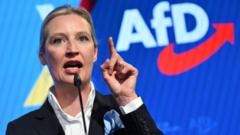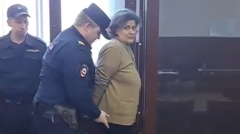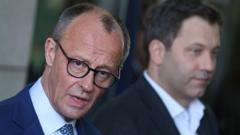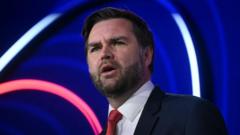The recent German elections highlighted a stark shift in voter behavior, the emergence of new political forces, and a challenging future for traditional parties.
**Shifting Dynamics in German Politics: Key Insights from the 2025 Election**

**Shifting Dynamics in German Politics: Key Insights from the 2025 Election**
A comprehensive analysis of the crucial outcomes in Germany's latest federal elections illustrates a nation undergoing significant political changes.
In a remarkable political shift, Germany's recent elections have heralded a transformation within its landscape, raising numerous questions about the future direction of the nation. As the Alternative for Germany (AfD) parties solidify their position, the elections have presented critical insights that paint a broader picture of an evolving society.
1. **AfD's Escalating Presence**: The AfD has remarkably expanded its influence, achieving a 20.8% share of the vote—up from previous years—making it the second-largest parliamentary force. This rise is particularly pronounced in East Germany, reminiscent of historical socio-political divisions, and is prompting some observers to question traditional party loyalties.
2. **Record Voter Turnout**: With an impressive voter turnout of 82.5%, marking a peak not seen since 1987, the sheer engagement in this election cycle underscores the heightened concern among citizens regarding their political representation and the pressing issues facing Germany today.
3. **Decline of Established Parties**: The outgoing Social Democrats (SPD) suffered their worst electoral performance in decades, only managing a mere 16.4%. Ongoing instability within the coalition and shifting allegiances have left established parties grappling with an uncertain future amid growing public dissatisfaction.
4. **Emerging Political Narratives**: The campaign revealed varied support across age demographics—young voters gravitated towards both AfD and the Left party, highlighting a potential generational rift. The resurgence of the Left party, partly fueled by viral content on platforms like TikTok, showcases how digital trends could reshape political campaigning.
5. **Leadership Changes on the Horizon**: Following the election, leaders of the former coalition government, including outgoing Chancellor Olaf Scholz, have announced their departures from frontline politics. This transition paves the way for new leadership in the Bundestag.
The developments in Germany's electoral landscape reflect broader societal tensions and the changing nature of political engagement, signaling that traditional frameworks may no longer adequately address voters' needs in the coming years.
1. **AfD's Escalating Presence**: The AfD has remarkably expanded its influence, achieving a 20.8% share of the vote—up from previous years—making it the second-largest parliamentary force. This rise is particularly pronounced in East Germany, reminiscent of historical socio-political divisions, and is prompting some observers to question traditional party loyalties.
2. **Record Voter Turnout**: With an impressive voter turnout of 82.5%, marking a peak not seen since 1987, the sheer engagement in this election cycle underscores the heightened concern among citizens regarding their political representation and the pressing issues facing Germany today.
3. **Decline of Established Parties**: The outgoing Social Democrats (SPD) suffered their worst electoral performance in decades, only managing a mere 16.4%. Ongoing instability within the coalition and shifting allegiances have left established parties grappling with an uncertain future amid growing public dissatisfaction.
4. **Emerging Political Narratives**: The campaign revealed varied support across age demographics—young voters gravitated towards both AfD and the Left party, highlighting a potential generational rift. The resurgence of the Left party, partly fueled by viral content on platforms like TikTok, showcases how digital trends could reshape political campaigning.
5. **Leadership Changes on the Horizon**: Following the election, leaders of the former coalition government, including outgoing Chancellor Olaf Scholz, have announced their departures from frontline politics. This transition paves the way for new leadership in the Bundestag.
The developments in Germany's electoral landscape reflect broader societal tensions and the changing nature of political engagement, signaling that traditional frameworks may no longer adequately address voters' needs in the coming years.



















